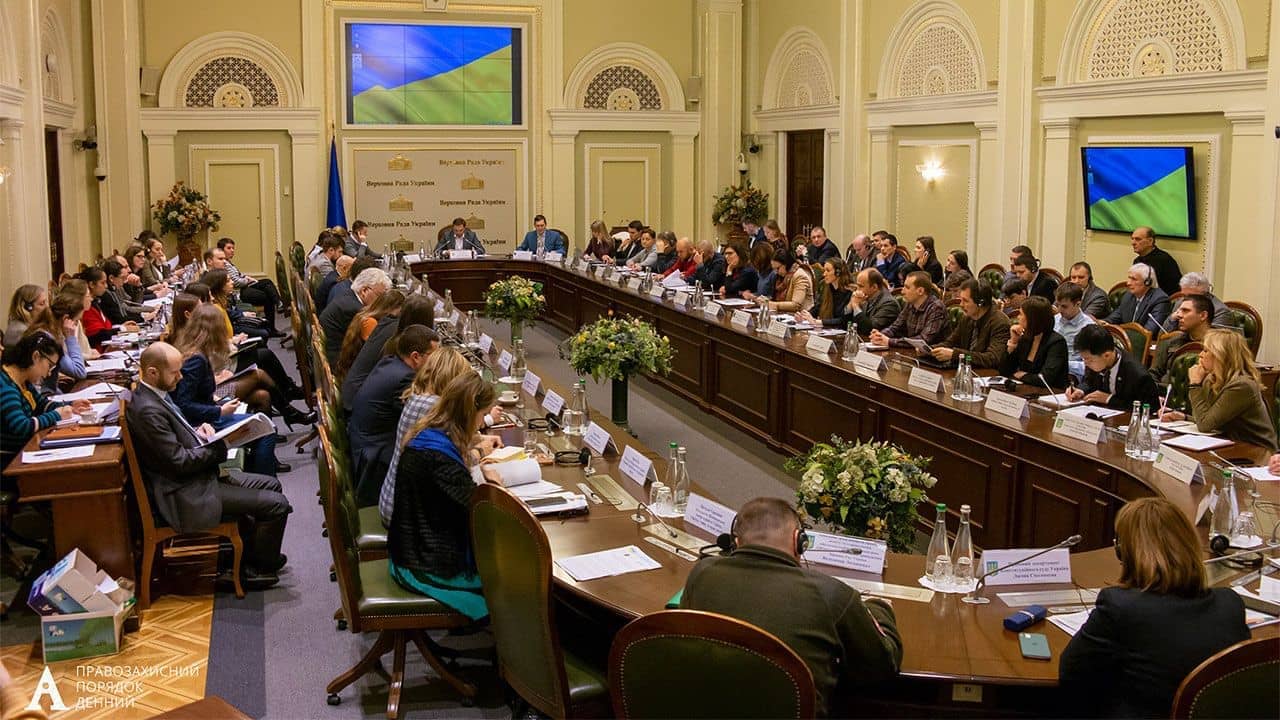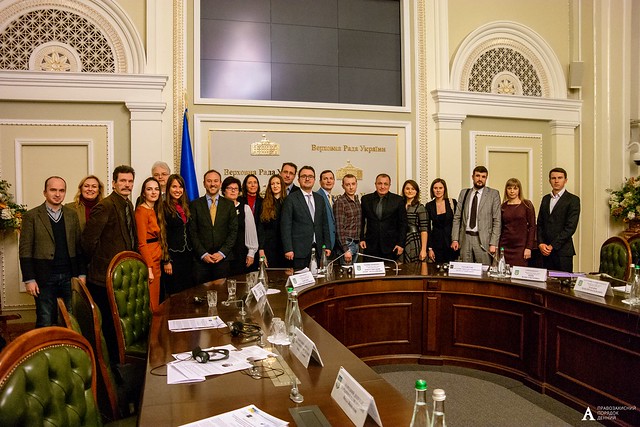
Kyiv/ Hague
On 5 February 2020, the Committee on Legislative Support of Law Enforcement of the Verkhovna Rada, chaired by Mr. Denys Monastyrskyi, MP, resolutely approved Bill no. 2689, which harmonizes the criminal code of Ukraine with international criminal law and international humanitarian law.
To support the passage of the Bill to the reading by the Plenary of the Verkhovna Rada, PGA’s partner NGO, Center for Civil Liberties, and the Law Enforcement Committee organized on 7 February a Roundtable on “The relevance of the implementation of the provisions of international criminal and humanitarian law on the prosecution of international crimes into the Criminal Code of Ukraine”. The Roundtable, moderated by Mr. Yenin Yevhenii Volodymyrovych, Deputy Director of the Ukrainian Institute for the Future and former Prosecutor General of Ukraine, was attended by over 120 participants. These included members of the Verkhovna Rada, members of the Ministry of Defence and Foreign Affairs of Ukraine, members of the diplomatic community in Ukraine, representatives of the UN and the International Committee of the Red Cross, as well as civil society and academics.
The opening speech of the Roundtable was held by Mr. Denys Monastyrskyi, MP, who expressed strong support for the implementing legislation and encouraged its swift adoption. Mr. Monastyrskyi underlined that the implementation of international humanitarian law aligns with the commitments of Ukraine stemming from various international and European instruments, while being crucial in enabling the country to address adequately its current situation of the on-going conflict.
The Roundtable touched upon the following issues:
-
The current legal framework is insufficient for Ukrainian authorities to hold perpetrators of grave crimes to account, highlighted the Deputy Prosecutor General, Mr. Hiunduz Mamedov, and Ms. Oleksandra Matviychuk (CCL), thus the swift adoption of the Bill by the plenary is essential.
-
The complementarity principle of the ICC places a primary obligation to investigate and prosecute crimes on Ukraine, as highlighted by the Permanent Representative of the President of Ukraine to the Autonomous Republic of Crimea, Mr. Anton Korynevych, as well as a representative of Global Rights Compliance (GRC), Mr. Scott Martin. Mr. Martin further underscored how the Ukrainian and ICC regimes can work in tandem, especially considering that the ICC can investigate only a limited ‘quantity’ of international crimes.
-
Mr. Korynevych emphasised the importance of the law for its deterrent effect as the current Bill lays down preconditions for future prosecution of Russian perpetrators, including for crimes committed against Crimean Tatars. These crimes have so far resulted in approximately 1.5 million internally displaced persons since the start of the conflict in eastern Ukraine in 2014.
-
The Head of the UN Human Rights Monitoring Mission in Ukraine, Ms. Matilda Bogner, as well as PGA’s Senior Legal Officer, Ms. Frederika Schweighoferova, explained the importance of aligning the legal provisions with international standards, suggesting concrete amendments to the Bill, including on war crimes, crimes against humanity and torture.
-
Ms. Viktoriya Mozgova from the Ukrainian Institute for the Future explained the compatibility of customary international law with the provision included in the Bill which allows for a retrospective qualification of crimes committed before the entry into force of the discussed the Bill as long as they have been considered as crimes under international law. She further endorsed the added benefits of the inclusion of the provision on Universal Jurisdiction in the current Bill, which had been previously explained by PGA’s Senior Legal Officer.
Ratification and Implementation: Crucial Pillars for Accountability
At the margins of the Law Enforcement Committee proceedings and seminar, PGA convened several high-level meetings with the Office of the Prosecutor General of Ukraine and the Office of the Prosecutor of the Autonomous Republic of Crimea, parliamentarians from the ruling Servant People’s Party and the opposition, as well as with United Nations (UN) representatives. The purpose of the meetings was to discuss the prospects of the adoption of the Bill and advocate in favor of the ratification of the Rome Statute, including with MPs for whom the ratification appeared not to be a priority issue.
The ratification of the ICC’s founding treaty became legally feasible on 1 July 2019, after the entry into force of the amendment to article 124 of the Constitution, which recognises the jurisdiction of the ICC by Ukraine. A large group of PGA Members in the past legislature of the Rada strongly supported the adoption of this constitutional revision in 2016,while criticizing a transitional provision that postponed the ratification of three years.
Moving Forward
Following the Roundtable, CCL prepared a resolution calling on the Members of Verkhovna Rada to support the Bill №2689 and to pass it in the Parliament without further delay. It stresses that after six years of ongoing armed conflict, Ukraine still lacks legal instruments to ensure criminal accountability for the crimes against humanity committed, while the provisions on war crimes in its criminal code do not fully meet the requirements of international law. Further, as only international crimes are exempt from statutory limitations, the accurate qualification of these actions today is crucial for bringing those responsible to justice, even in a distant future.
In furtherance of these objectives, PGA members-parliamentarians of the National Group in Ukraine, alongside international and domestic legal experts and human rights activists, will continue to advocate for the Bill to get passed into law by the Verkhovna Rada.
Bill 2689
The preliminary drafting process of the Bill 2689, sponsored by the Chair of the Law Enforcement Committee, Mr. Denys Monastyrskyi, benefitted from the contributions of the PGA Secretariat and many domestic and international experts. These include the Centre for Civil Liberties; Mr. Konstantin Zadoya (Taras Shevchenko National University of Kyiv); Mr. Anton Koryneych (Permanent Representative of the President of Ukraine in the Autonomous Republic of Crimea); leadership members of the Crimean Office of the Prosecutor; Ms. Viktoryia Mozgova (Ukrainian Institute for the Future) and Mr. Scott Martin (Global Rights Compliance).




